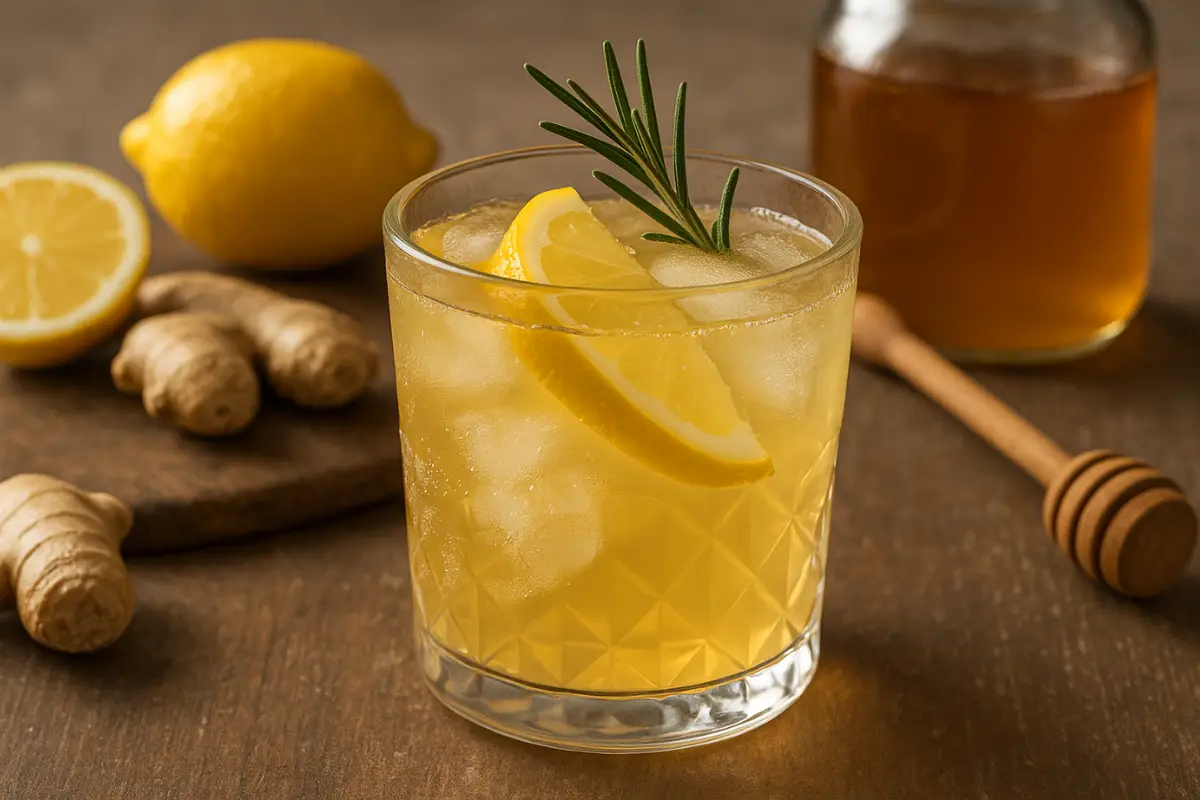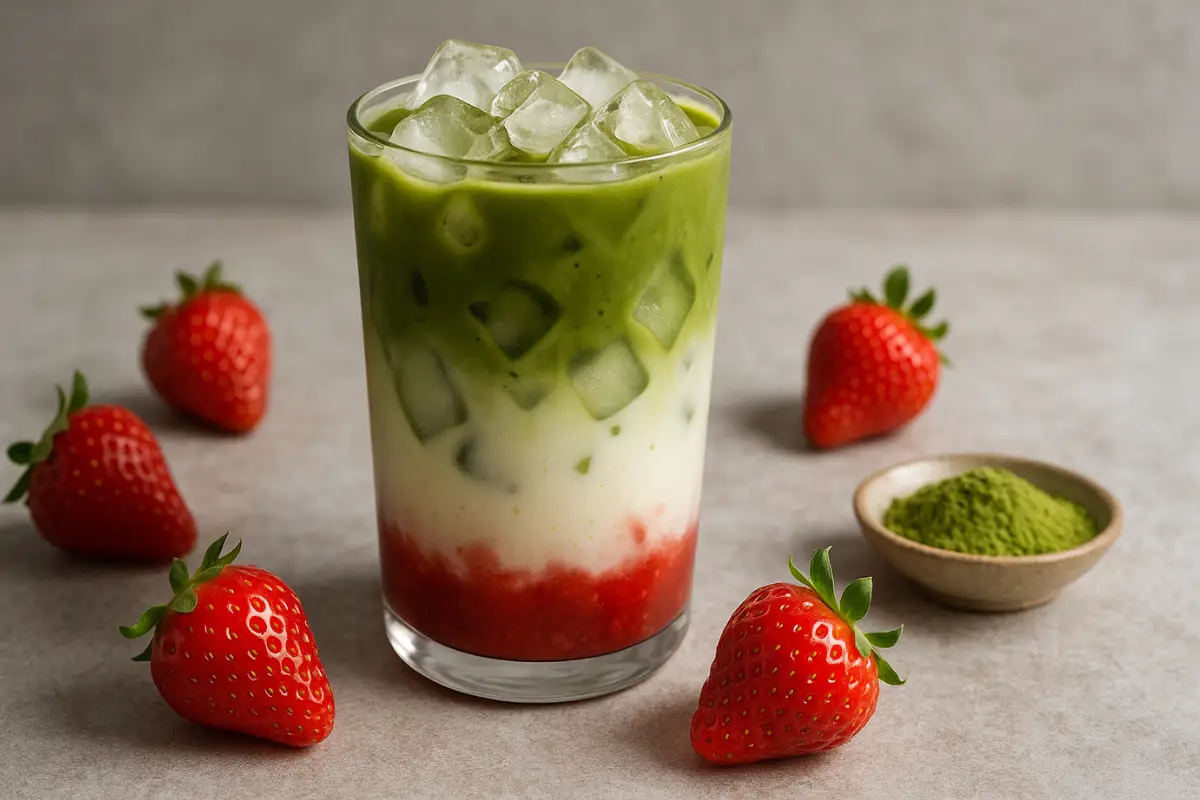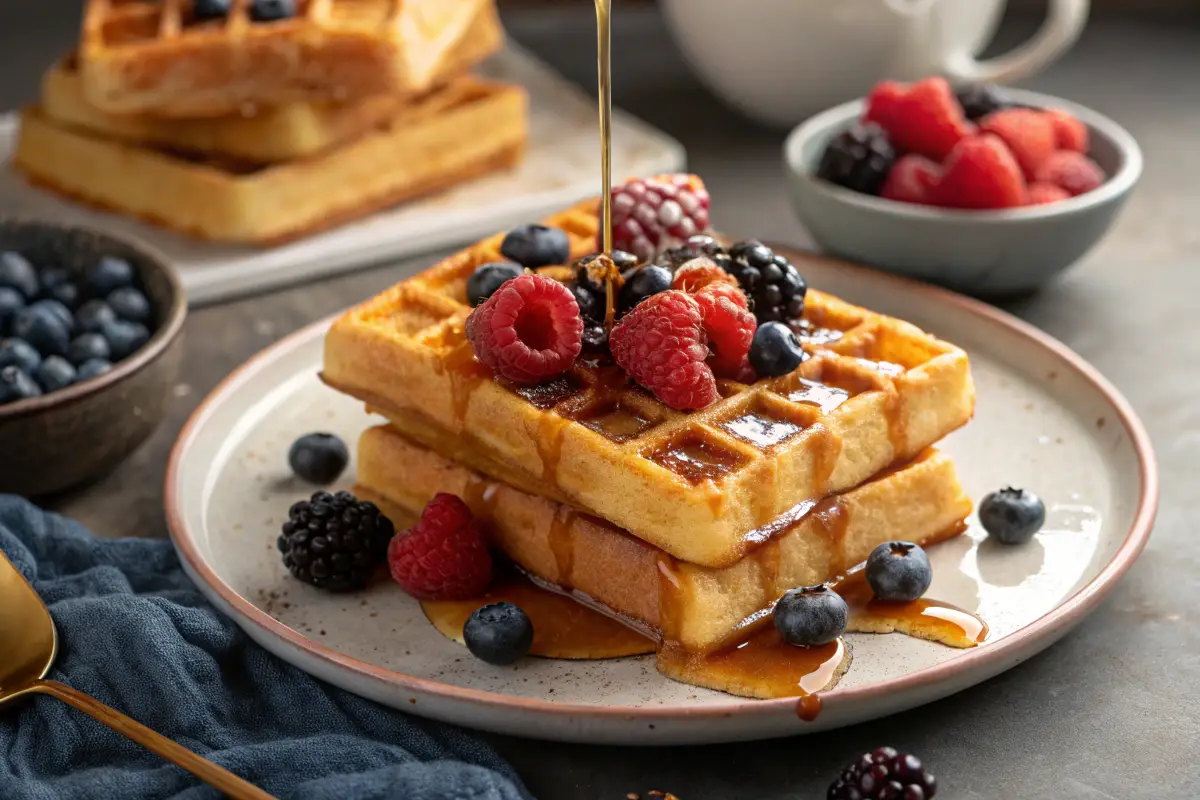Here’s an introduction with integrated internal links relevant to your topic:
Ever thought about if the yummy vanilla extract in your recipes has gluten? You might think vanilla extract is gluten-free because it comes from vanilla beans. But, it’s not that simple.
There are real differences between pure and imitation vanilla. Plus, there’s a chance of gluten getting in during making. This is important for people with gluten issues or celiac disease.
We’ll look into if vanilla extract is really gluten-free. We’ll also talk about how to pick the right vanilla for your baking. Brands like Nielsen-Massey and Simply Organic have gluten-free options, so you can make your favorite dishes without worrying about gluten. Check out gluten-free baking tips, how to make perfect gluten-free cookies, and essential gluten-free ingredients for more baking inspiration.
Table of contents
Understanding Vanilla Extract
Vanilla extract is loved by cooks everywhere for its special smell and taste. To understand vanilla extract, we must look at where it comes from and how it’s made. It’s made by soaking vanilla beans in alcohol and water. This pulls out the beans’ natural oils, making the flavor we all know.
What is Vanilla Extract?
Vanilla extract explained falls into two types: pure and imitation. Pure vanilla comes only from vanilla beans. Imitation vanilla has extra stuff that tastes like vanilla. The best vanilla beans come from places like Madagascar, Mexico, or Tahiti.
Making pure vanilla extract is hard and expensive. It takes a lot of work to grow and pick the beans.
The Differences Between Pure and Imitation Vanilla Extract
Pure vanilla extract is better in taste and quality than imitation. Pure vanilla is gluten-free because the alcohol makes it safe. Imitation vanilla might have things like corn syrup and color, so check the label if you’re gluten sensitive.
Also, while most food additives in the US are gluten-free, people with celiac disease should always check labels. Knowing the difference helps you choose the right vanilla extract for your cooking.
| Type of Vanilla Extract | Ingredients | Flavor Profile | Gluten-Free Status | Price Range |
|---|---|---|---|---|
| Pure Vanilla Extract | Vanilla beans, alcohol | Rich, traditional vanilla flavor | Yes | Higher due to production costs |
| Imitation Vanilla Extract | Synthetic vanillin, additives | Less complex, artificial flavor | Check label for allergen info | Usually lower, more affordable |
Both types have their uses in cooking. But knowing the difference is key to making sure your food is good and safe.
Is Vanilla Extract Gluten-Free?
Pure vanilla extract is usually gluten-free. This is because the distillation process removes gluten. It’s important to know the difference between pure and imitation vanilla. Imitation vanilla can have gluten or corn syrup, which is bad for those with gluten sensitivity.
The Gluten Content in Pure Vanilla Extract
Pure vanilla extract is made from vanilla beans and alcohol. The alcohol is often from sugar cane or grain. Brands like Nielsen-Massey make gluten-free vanilla extract. It’s safe for those on a gluten-free diet.
Alcohol Base of Vanilla Extract and Gluten Sensitivity
People with gluten sensitivity need to watch the alcohol base. Most pure vanilla is safe, but imitation vanilla might not be. Always check the labels to avoid allergic reactions. Knowing what to look for helps you make safe choices.
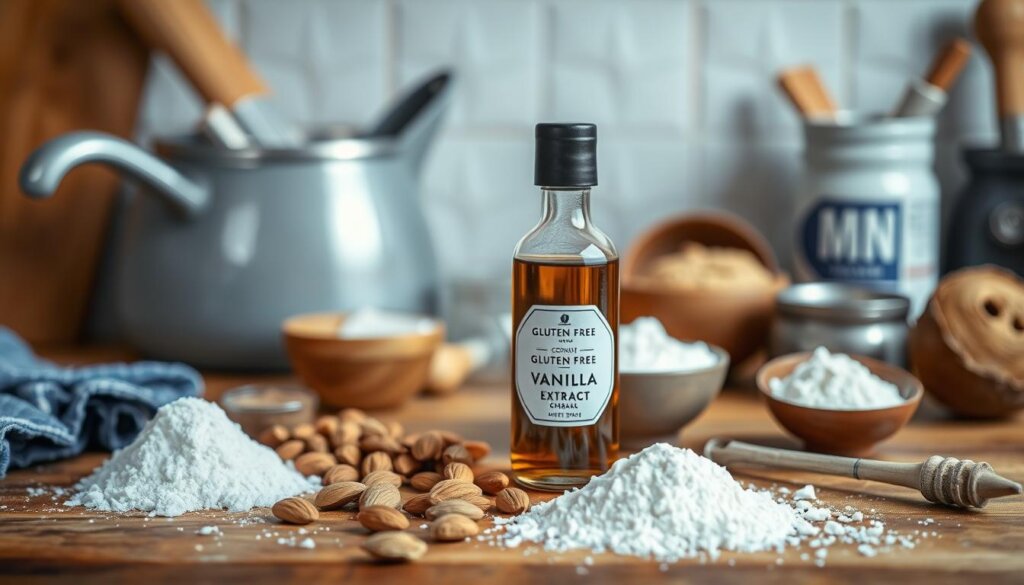
| Nutritional Content | Per Serving (5ml) |
|---|---|
| Total Carbohydrates | 6.18g |
| Total Fat | 0.37g |
| Saturated Fat | 0.12g |
| Cholesterol | 1.0mg |
| Sodium | 23.18mg |
| Dietary Fiber | 0.09g |
| Total Sugars | 6.09g |
| Added Sugars | 1g |
| Protein | 0.11g |
| Vitamin D | 0.55mcg |
| Calcium | 33.5mg |
| Iron | 55.8mg |
| Potassium | 155mg |
Choosing Safe Vanilla Extract Brands
When picking vanilla extract, safety and quality are key. You want it to taste great and be gluten-free. Choosing certified gluten-free vanilla brands makes your cooking safer and better.
Brands that are Certified Gluten-Free
Many trusted brands offer gluten-free vanilla extracts. Nielsen-Massey and Simply Organic are great choices. They have the Gluten-Free Certification Organization (GFCO) seal, showing their products are safe for those with gluten issues.
Mccormick is another good pick. They use distilled alcohol, so there’s no gluten risk. Blue Cattle Truck Trading Co. focuses on organic quality and uses premium Mexican vanilla beans. They avoid gluten. Singing Dog even has an alcohol-free vanilla extract that’s gluten-free and safe for everyone.
What to Look for on Labels
Reading labels for gluten is important. Here’s what to look for in vanilla extract packaging:
- Look for the Certified Gluten-Free seal from recognized organizations.
- Check the ingredients list for any gluten sources, like additives.
- Be careful of imitation vanilla extracts. They might have gluten without saying so.
By choosing gluten-free vanilla extract brands wisely, you can safely add flavor to your cooking. This makes your baking better and safer.
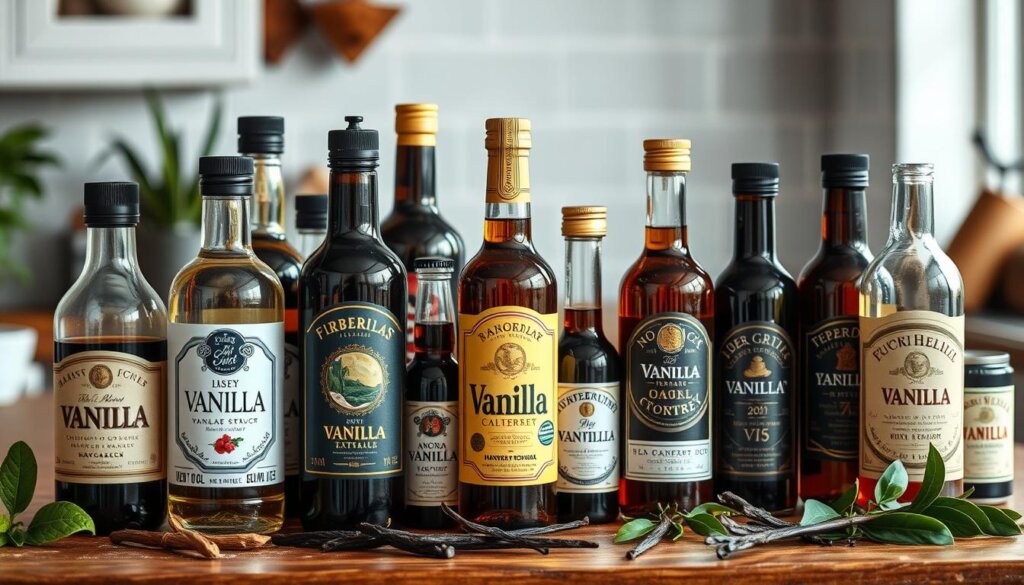
Potential Risks with Imitation Vanilla Extract
Imitation vanilla extract might seem like a good deal. But, it can have gluten additives in it. These can be hidden unless you check the ingredient labels closely.
Common Additives and Their Gluten Content
Imitation vanilla often has additives. Some of these additives may have gluten. Here are a few examples:
- Corn syrup or other sweeteners
- Flavoring agents from gluten grains
- Coloring agents that might be gluten-based
If you have celiac disease or gluten sensitivity, this is important. Gluten additives can be harmful. So, it’s key to watch out for them.
The Importance of Reading Ingredient Labels
Reading ingredient labels carefully can help avoid gluten. Look for signs that show a product is safer:
| Label Indicator | Description |
|---|---|
| Certified Gluten-Free | Means the product has less than 20 ppm gluten. |
| No Artificial Colors/Flavors | Products without synthetic additives are safer from gluten. |
| Natural Ingredients | Brands that use natural ingredients are more likely to be gluten-free. |
By following these tips, you can enjoy tasty foods without health risks.
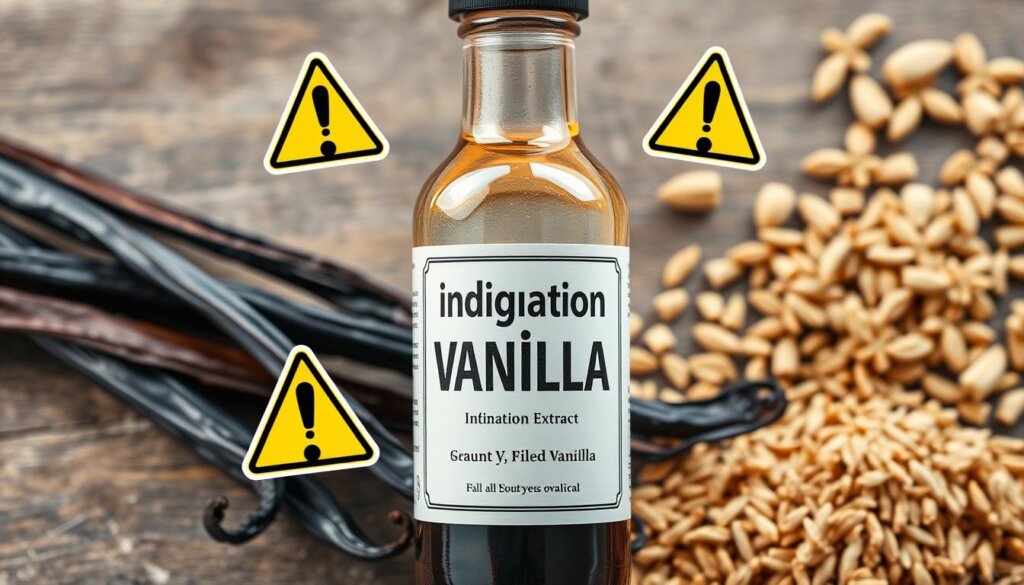
Alternatives to Vanilla Extract
Want to try new flavors in your cooking or baking? There are many vanilla extract alternatives. You can find gluten-free options or make your own homemade vanilla extract.
Gluten-Free Natural Flavorings
Natural flavorings are great substitutes for vanilla extract. Here are some good ones:
- Almond Extract: It’s stronger than vanilla, so use it carefully in desserts.
- Maple Syrup: It adds moisture and sweetness, making it a great choice.
- Honey: Use 1 tablespoon to replace 1 teaspoon of vanilla extract for a richer taste.
- Bourbon, Rum, or Brandy: Use 2 teaspoons of these spirits for every 1 teaspoon of vanilla extract for more depth.
- Vanilla-Flavored Plant-Based Milk: It’s a creative alternative, used in a 1:1 ratio with vanilla extract.
- Vanilla Powder: Use it at a 1:1 ratio for the best flavor match, as recommended by manufacturers.
- Vanilla Paste: It can replace vanilla extract at the same 1:1 ratio, adding texture and flavor.
Homemade Vanilla Extract Recipe
Making homemade vanilla extract is easy. It involves soaking vanilla beans in alcohol. You can make sure the ingredients are gluten-free and adjust the flavor. Here’s how:
- Split 5-6 vanilla beans and put them in a dark glass bottle.
- Fill the bottle with high-proof alcohol like vodka or bourbon, making sure the beans are covered.
- Seal the bottle and keep it in a cool, dark place. Shake it gently every few weeks.
- Wait at least 8 weeks before using it for a strong flavor.
Homemade vanilla extract lets you control the flavor and ensures it’s safe for your needs.
| Substitute | Ratio to Vanilla Extract | Flavor Profile |
|---|---|---|
| Almond Extract | 1/2 tsp for 1 tsp | Strong, Nutty |
| Maple Syrup | 1:1 | Sweet, Rich |
| Honey | 1 tbsp for 1 tsp | Sweet, Floral |
| Bourbon/Rum/Brandy | 2 tsp for 1 tsp | Deep, Complex |
| Vanilla-Flavored Plant-Based Milk | 1:1 | Subtle Vanilla |
| Vanilla Powder | 1:1 | Concentrated Vanilla |
| Vanilla Paste | 1:1 | Rich, True Vanilla |
These alternatives and homemade options give you flexibility. They help you keep your gluten-free diet while enjoying great flavors in your dishes.
Consumer Awareness and Best Practices
Keeping a gluten-free kitchen safe is key. You must focus on kitchen safety to avoid gluten exposure. Knowing how to keep your space clean is vital to prevent cross-contamination.
How to Ensure Safety in Your Kitchen
To make your cooking area safe, follow these steps:
- Keep surfaces clean and sanitized, focusing on gluten-free food prep.
- Use separate utensils for gluten and gluten-free foods.
- Have special storage for gluten-free items to avoid mixing.
- Check and throw away expired or compromised items often.
Understanding Cross-Contamination Risks
Cross-contamination is a big risk in kitchens. Be careful about where your ingredients come from. Even gluten-free products can be risky if they’re made in places that handle gluten.
Getting involved in consumer awareness and knowing labels is important. This helps you make better choices.
Know about common allergens. The FDA has found many hidden allergens in gluten-free products. Following these tips will help you avoid gluten sensitivities and enjoy cooking.
Conclusion
Pure vanilla extract is usually gluten-free, making it safe for gluten-free baking. The FDA has rules for labeling, helping you find gluten-free options. Studies show no gluten in artificial vanilla extract, making it safe for those with gluten sensitivity.
When choosing vanilla extract, pick high-quality, gluten-free brands. Always check the labels, as some imitation extracts may have harmful additives. If unsure, try other flavorings to keep your recipes safe and interesting. For more on vanilla extract’s gluten status, see this resource.
Knowing about cross-contamination and vanilla extract ingredients helps you make safe choices. By learning about gluten-free vanilla, you can safely add this flavor to your cooking.
FAQ
Is vanilla extract generally gluten-free?
Yes, pure vanilla extract is usually gluten-free. It comes from vanilla beans. The alcohol distillation process removes gluten. But, always check for gluten-free certification.
What should I look for when selecting vanilla extract?
Pick brands that say their vanilla is gluten-free. Look for Nielsen-Massey, Simply Organic, and McCormick. Always read the ingredient labels to avoid gluten.
Are there risks associated with imitation vanilla extract?
Yes, imitation vanilla might have gluten or corn syrup. Always check the ingredients. This is important if you have gluten sensitivity or celiac disease.
Can I make my own gluten-free vanilla extract?
Absolutely! Making your own vanilla extract is easy. Just soak vanilla beans in gluten-free alcohol. This way, you can control the ingredients and flavor.
How can I prevent cross-contamination in my kitchen?
Clean surfaces and utensils well. This is key when working with gluten. Also, be careful with shared equipment for gluten-free and gluten foods.
What are some gluten-free alternatives to vanilla extract?
Try using almond or maple extract instead. These are natural and don’t have gluten. They add different flavors safely.
How can alcohol bases in vanilla affect gluten sensitivity?
Pure vanilla extract’s alcohol is safe because it’s distilled. This removes gluten. But, imitation vanilla might have gluten. So, be careful.
How do I identify gluten-free brands?
Look for the “gluten-free” label on packaging. Nielsen-Massey, Simply Organic, and McCormick are good choices. They focus on gluten-free quality.
Which brands of vanilla extract are gluten-free?
Popular gluten-free vanilla extract brands include McCormick, Nielsen-Massey, and Simply Organic. Always check labels for certification.
Why is vanilla not gluten-free?
Pure vanilla extract is typically gluten-free, but some flavored or imitation vanilla extracts may contain additives or alcohol derived from gluten sources.
Is McCormick vanilla extract celiac safe?
Yes, McCormick vanilla extract is gluten-free and safe for celiacs.
Is Costco vanilla extract gluten-free?
Yes, Costco’s Kirkland Signature pure vanilla extract is gluten-free and safe for celiacs. Always check the label for updates.


